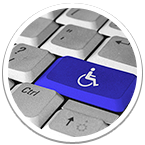Rights of children with disabilities
On this page
Children are foremost children
Children with disabilities are first and foremost children – a person should not be defined by their disability. Children with disabilities should be able to live within their families and communities under the same conditions as all other children. Besides an accessible environment, children should receive adequate care, education and understanding. They have the right to live in conditions that ensure their human dignity, promote self-confidence and support active participation in the society. Disability or challenges in communicating should not prevent children from voicing their opinion.
Convention on the Rights of the Child
According to the United Nations Convention on the Rights of the Child, all children have the right to a provision of society’s resources, to protection and to participation in society. Also in line with the UN Convention on the Rights of Persons with Disabilities (CRPD), the best interest of the child is to be held as the main objective. This also binds all authorities acting with the child. In assessing the best interest of the child, it is important to make a difference between the child’s interest and that of the parents.
Disabled children have a higher risk of being mistreated, of suffering from mental, physical or sexual violence, or of bullying. They must be protected from all violence, neglect and abuse. Children also have the right to know their rights.
Convention on the Rights of the Child (United Nations Human Rights)
Education
Early childhood education and care (ECEC)
The municipalities have a legal obligation to organise early childhood education and care (ECEC) for children under school age to the scope that meets the needs of the municipality. According to the Act on Early Childhood Education and Care, every child has the right to receive early childhood education.
Early childhood is a phase of intense development and learning, and ECEC is the basis of the Finnish education system. A personal ECEC plan is prepared for each child in an ECEC centre or family-based daycare to implement the upbringing, education and care of the child.
The three levels of support are general, enhanced and special needs support. A child in need of support has to be guaranteed adequate individual support and guidance, for example with the help of an assistant or by taking the child into account in the number of staff. ECEC for a child with disabilities can also be arranged in a special group at an ECEC centre or family-based daycare.
Early childhood education and care (Finnish National Agency for Education)
Basic education
A child with a disability has the same right to receive a basic education as a fundamental and human right as all other children. According to the Basic Education Act, a child with a disability receives the support they need in order to partake in basic education, such as assistive equipment, special needs education, and interpretation and assistant services. The three levels of support for learning and school attendance are general, enhanced and special needs support. Support must be given as soon as the need for it is detected.
Children with disabilities are entitled to school transport if they are unable to use public transport. An alternative to free transport is an adequate subsidy for transporting or accompanying the pupil to school. Children with intellectual disabilities often also have extended compulsory education, which can mean, for instance, two years of pre-primary education.
- Basic education (Finnish National Agency for Education)
- Support for learning and school attendance (Ministry of Education and Culture)
- The Valteri Centre for Learning and Consulting (valteri.fi)
Secondary and higher education
The forms of secondary education based on the basic education curriculum in Finland are general upper secondary education and vocational education. Vocational training for students with disabilities is provided in regular vocational schools and in special vocational schools that provide training for students with special needs. Secondary education students with disabilities as well as university students with disabilities are entitled to disability services organised by the wellbeing services county, such as a personal assistance and transport services.
An alternative is rehabilitative instruction and guidance for students with disabilities, which is tailored according to a student’s individual goals. VALMA training enables strengthening the various abilities of the student and prepares the student for the requirements of vocational training. TELMA training is aimed at students with special needs who are unable to attend secondary education because of a disability or illness. TELMA trains the skills needed in an independent life and helps to develop the student’s functioning related to working and participation.
Non-Violent Childhoods: Action Plan for the Prevention of Violence against Children 2020–2025
See chapter 13.2 for children and young people with disabilities
Ministry of Social Affairs and Health 2020




